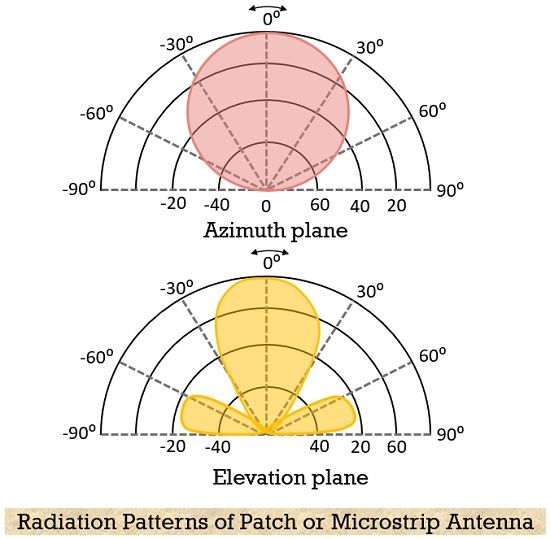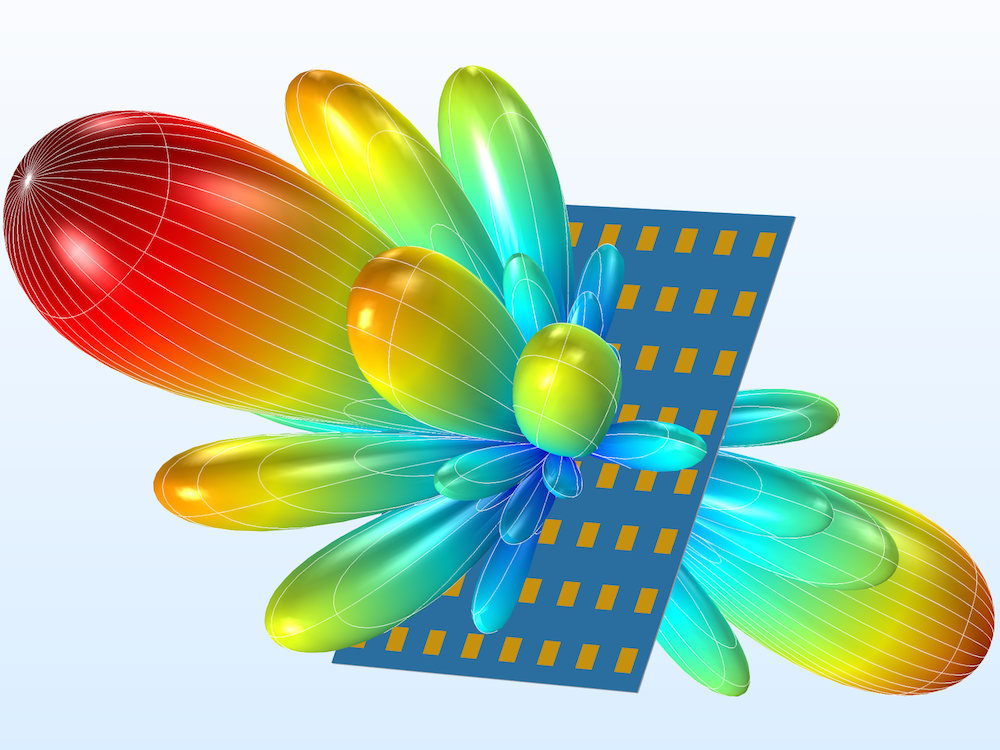Patch Antenna Radiation Pattern
Patch Antenna Radiation Pattern - The pattern curves in figure 12 verify that the shorting patches increased the antenna’s gain by boosting the main level with reduced side lobe. It is unique to an individual antenna and is made up by plotting its far field (normally radiating) radiation as charted coordinates. This radiation pattern shows that the antenna radiates more power in a certain direction than another direction. The antenna is also low profile and low cost, has good conformability, and has ease of manufacturing. The energy radiated by an antenna is represented by the radiation pattern of the antenna. This simple antenna is a suitable. This power variation as a function of the arrival angle is observed in the antenna's far field. Web the radiation pattern of a patch antenna is a function of its width and the shape of its substrate. Higher gains (up to 10 dbi) can be achieved by using different means including large patch heights and parasitic patches. It demonstrates the usage of open boundary conditions for antennas and farfield monitors with the general purpose frequency domain solvers. Topics include principles of operation, impedance matching, radiation patterns, circular polarization, bandwidth, efficiency, alternative feed types, stacked patches and higher It demonstrates the usage of open boundary conditions for antennas and farfield monitors with the general purpose frequency domain solvers. Understand how patch antennas radiate. This power variation as a function of the arrival angle is observed in the antenna's far field. Higher gains (up to 10 dbi) can be achieved by using different means including large patch heights and parasitic patches. This radiation pattern shows that the antenna radiates more power in a certain direction than another direction. Let us look at the pattern of energy radiation. The two features of a patch antenna are a width w and a length l. Web the radiation pattern of a patch antenna is a function of its width and the shape of its substrate. Web an antenna operating in multiband can be designed by creating a staircase pattern in the patch which also results in a 60% reduction in antenna size operating at millimeter wave band. The energy radiated by an antenna is represented by the radiation pattern of the antenna. Web a radiation pattern defines the variation of the power radiated by an antenna as a function of the direction away from the antenna. Web measuring an antenna's radiation pattern and gain is discussed. The antenna is also low profile and low cost, has good. This power variation as a function of the arrival angle is observed in the antenna's far field. The design initially ran through To test, the radiation pattern's recovery capabilities of the ns. Web the radiation pattern of microstrip or patch antenna is broad. In a cavity, only certain modes are allowed to exist, at different resonance The two features of a patch antenna are a width w and a length l. Initially, a patch antenna element is carefully designed pertaining to the resonance band of 28 ghz. Let us look at the pattern of energy radiation. Web a radiation pattern, or antenna pattern is a graphical representation of how a particular antenna radiates or receives energy.. The radiation pattern of a microstrip or patch antenna is shown above. The energy radiated by an antenna is represented by the radiation pattern of the antenna. Radiation is accounted for by using an effective loss tangent for the substrate. The patch of the antenna must be a very thin conductive region, t<<λ 0 (: For this calculation, a substrate. Higher gains (up to 10 dbi) can be achieved by using different means including large patch heights and parasitic patches. Web a radiation pattern defines the variation of the power radiated by an antenna as a function of the direction away from the antenna. And maintains a consistent radiation pattern. The radiation pattern of a microstrip or patch antenna is. Design a rectangular patch antenna. To have a greater directivity, an array can be formed by using these patch antennas. Its size reduces by using a multilayer substrate. Web the radiation pattern of a patch antenna is a function of its width and the shape of its substrate. Web a radiation pattern defines the variation of the power radiated by. Topics include principles of operation, impedance matching, radiation patterns, circular polarization, bandwidth, efficiency, alternative feed types, stacked patches and higher It has low radiation power and narrow frequency bandwidth. To test, the radiation pattern's recovery capabilities of the ns. Λ 0 free space wavelength). This radiation pattern shows that the antenna radiates more power in a certain direction than another. The figure below represents the radiation pattern of the microstrip antenna: To test, the radiation pattern's recovery capabilities of the ns. Web the radiation pattern of an antenna gives us information about its receiving and transmitting properties in different directions. For this calculation, a substrate height of 50 µ m is chosen. Web fundamental specifications of patch antennas radiation pattern. Select frequency around 10ghz, then press ‘compute’. Web measuring an antenna's radiation pattern and gain is discussed. Web this article introduces the basic concepts of patch antennas. The radiation pattern of a microstrip or patch antenna is shown above. Understand how patch antennas radiate. Select frequency around 10ghz, then press ‘compute’. Web a radiation pattern, or antenna pattern is a graphical representation of how a particular antenna radiates or receives energy. Boxed sections that start with the word ”extra” are not required for tests. After waiting, a 3d radiation pattern window will show up. The fields are linearly polarized, and in the horizontal direction. The two features of a patch antenna are a width w and a length l. The patch of the antenna must be a very thin conductive region, t<<λ 0 (: Web the patch acts approximately as a resonant cavity (with perfect electric conductor (pec) walls on top and bottom, and perfect magnetic conductor (pmc) walls on the edges). And maintains a consistent radiation pattern. The general idea and necessary steps are indicated. Web an antenna operating in multiband can be designed by creating a staircase pattern in the patch which also results in a 60% reduction in antenna size operating at millimeter wave band. The fields are linearly polarized, and in the horizontal direction when viewing the microstrip antenna as in. Initially, a patch antenna element is carefully designed pertaining to the resonance band of 28 ghz. Web this example shows a rectangular patch antenna. This simple antenna is a suitable. Let us look at the pattern of energy radiation. Higher gains (up to 10 dbi) can be achieved by using different means including large patch heights and parasitic patches. Use mouse drag around it to see the pattern from different angles. The pattern curves in figure 12 verify that the shorting patches increased the antenna’s gain by boosting the main level with reduced side lobe. Web the radiation pattern of an antenna gives us information about its receiving and transmitting properties in different directions. Web this article introduces the basic concepts of patch antennas.What is Patch (Microstrip) Antenna? Construction, Working, Radiation
Antenna's radiation patterns in Eand Hplanes for a monopole antenna
Introduction to Efficiently Modeling Antennas in COMSOL Multiphysics
3D radiation patterns of patch antennas with different slot loading at
(A) Normalized radiation pattern of turnstile‐shaped patch antenna at
Normalised radiation patterns of optimised dual‐band patch antenna
15 Radiation pattern of simple patch antenna at 2.415 GHz integrated
Patch antenna element A, Circular patch geometry; B, path element 3D
How to interpolate E & H field principal cuts to make 3D antenna
Antennas Navipedia
The Resulting Radiation Pattern Is Shown In Figure 13.
After Waiting, A 3D Radiation Pattern Window Will Show Up.
The Design Initially Ran Through
Its Size Reduces By Using A Multilayer Substrate.
Related Post:









